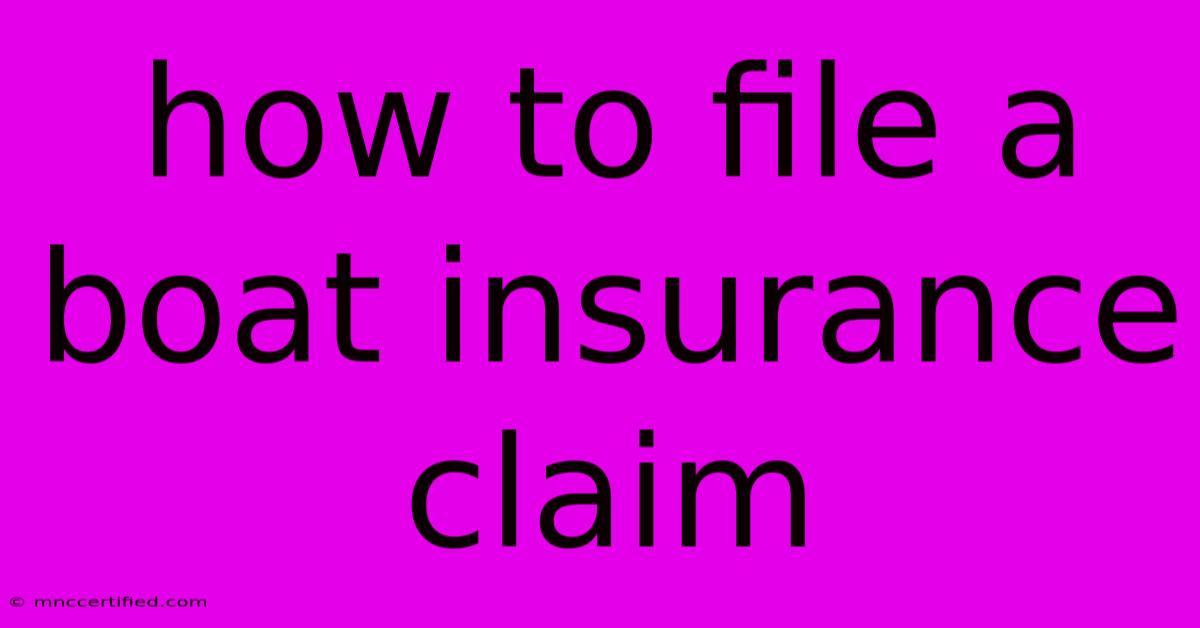How To File A Boat Insurance Claim

Table of Contents
How to File a Boat Insurance Claim: A Step-by-Step Guide
Filing a boat insurance claim can feel daunting, but understanding the process can make it significantly smoother. This comprehensive guide will walk you through each step, ensuring you're prepared to navigate the process effectively and receive the compensation you deserve. We'll cover everything from initial reporting to final settlement, helping you avoid common pitfalls along the way.
1. Immediate Actions After a Boating Accident
Before you even think about paperwork, there are crucial steps to take immediately following an accident or incident requiring a claim:
- Ensure Safety: Prioritize the safety of yourself, your passengers, and others involved. Administer first aid if necessary and contact emergency services (911 or your local equivalent) if anyone is injured.
- Document the Scene: Take photos and videos of the damage to your boat, any other involved vessels, and the accident scene itself. This includes documenting any visible injuries, environmental conditions (weather, water conditions), and potential contributing factors. The more evidence you gather, the stronger your claim will be.
- Gather Information: Collect contact information from all parties involved, including witnesses. Note down their names, phone numbers, addresses, and insurance details. If possible, get written statements from witnesses.
- Report to Authorities: Depending on the severity of the incident and local regulations, you may be required to report the accident to the Coast Guard or other relevant authorities. Do this as soon as possible.
2. Contact Your Boat Insurance Provider
Once the immediate aftermath is addressed, promptly contact your boat insurance provider. Most policies have a specific timeframe for reporting incidents, so don't delay.
- Report the Claim: Clearly explain the circumstances of the accident, providing all the information you've gathered. Your insurer will likely assign you a claims adjuster who will guide you through the next steps.
- Provide Documentation: Be prepared to provide documentation such as your policy information, photos and videos of the damage, police reports (if applicable), and contact information of all parties involved.
- Be Honest and Accurate: Provide truthful and accurate information throughout the process. Any inaccuracies or omissions could jeopardize your claim.
3. Working with Your Insurance Adjuster
Your insurance adjuster will be your primary point of contact throughout the claims process.
- Cooperation is Key: Cooperate fully with the adjuster's investigation. This includes providing requested documentation promptly and answering questions honestly and thoroughly.
- Understand the Process: Ask clarifying questions if you're unsure about any aspect of the claims process. Don't hesitate to seek clarification on timelines, required documentation, or settlement options.
- Keep Records: Maintain detailed records of all communications, including dates, times, and the names of individuals you've spoken with. This documentation will be invaluable if any disputes arise.
4. Boat Repair and Appraisal
Depending on the extent of the damage, your insurer may require a professional appraisal of your boat.
- Authorized Repair Shops: Your insurer may recommend using a network of authorized repair shops. While using an approved shop might streamline the process, you generally have the right to choose your own reputable repair facility. Discuss this with your adjuster.
- Repair Estimates: Obtain detailed repair estimates from the chosen shop. Submit these estimates to your adjuster for review and approval before proceeding with repairs.
- Documentation of Repairs: Keep detailed records of all repairs, including invoices, receipts, and any communication with the repair shop.
5. Claim Settlement
Once the repairs are completed (or if the damage is deemed a total loss), your insurance company will process your claim settlement.
- Settlement Options: You may receive a direct payment for repairs or a settlement check for the value of your boat if it's a total loss. Understand the terms of the settlement before accepting it.
- Negotiation: If you disagree with the offered settlement amount, you have the right to negotiate with your insurer. Have your supporting documentation readily available.
- Legal Counsel: If you are unable to reach a satisfactory agreement with your insurer, consider consulting with a legal professional specializing in insurance claims.
Preventing Future Issues: Proactive Measures
Proactive steps can significantly aid in the smooth handling of future insurance claims.
- Accurate Boat Valuation: Ensure your boat is accurately valued on your insurance policy. Regularly review and update the value to reflect any improvements or market fluctuations.
- Detailed Inventory: Maintain a detailed inventory of your boat's equipment and accessories, including photos and receipts. This will expedite the claims process in the event of theft or damage.
- Regular Maintenance: Proper boat maintenance demonstrates responsible ownership and can reduce the likelihood of claims related to neglect or preventable damage.
Filing a boat insurance claim can be a complex process, but by following these steps and remaining organized and communicative, you can significantly improve your chances of a successful outcome. Remember, your insurance provider is there to help, but proactive preparation and clear communication are essential for a smooth and efficient claims process.

Thank you for visiting our website wich cover about How To File A Boat Insurance Claim. We hope the information provided has been useful to you. Feel free to contact us if you have any questions or need further assistance. See you next time and dont miss to bookmark.
Featured Posts
-
Campbell Clinic Insurance Accepted
Nov 16, 2024
-
Mike Tyson Vs Jake Paul Full Fight Details
Nov 16, 2024
-
10 To 140 Nations League Accumulator
Nov 16, 2024
-
Emergency Dental Utah No Insurance
Nov 16, 2024
-
Watch Children In Need 2024 Bbc Guide
Nov 16, 2024